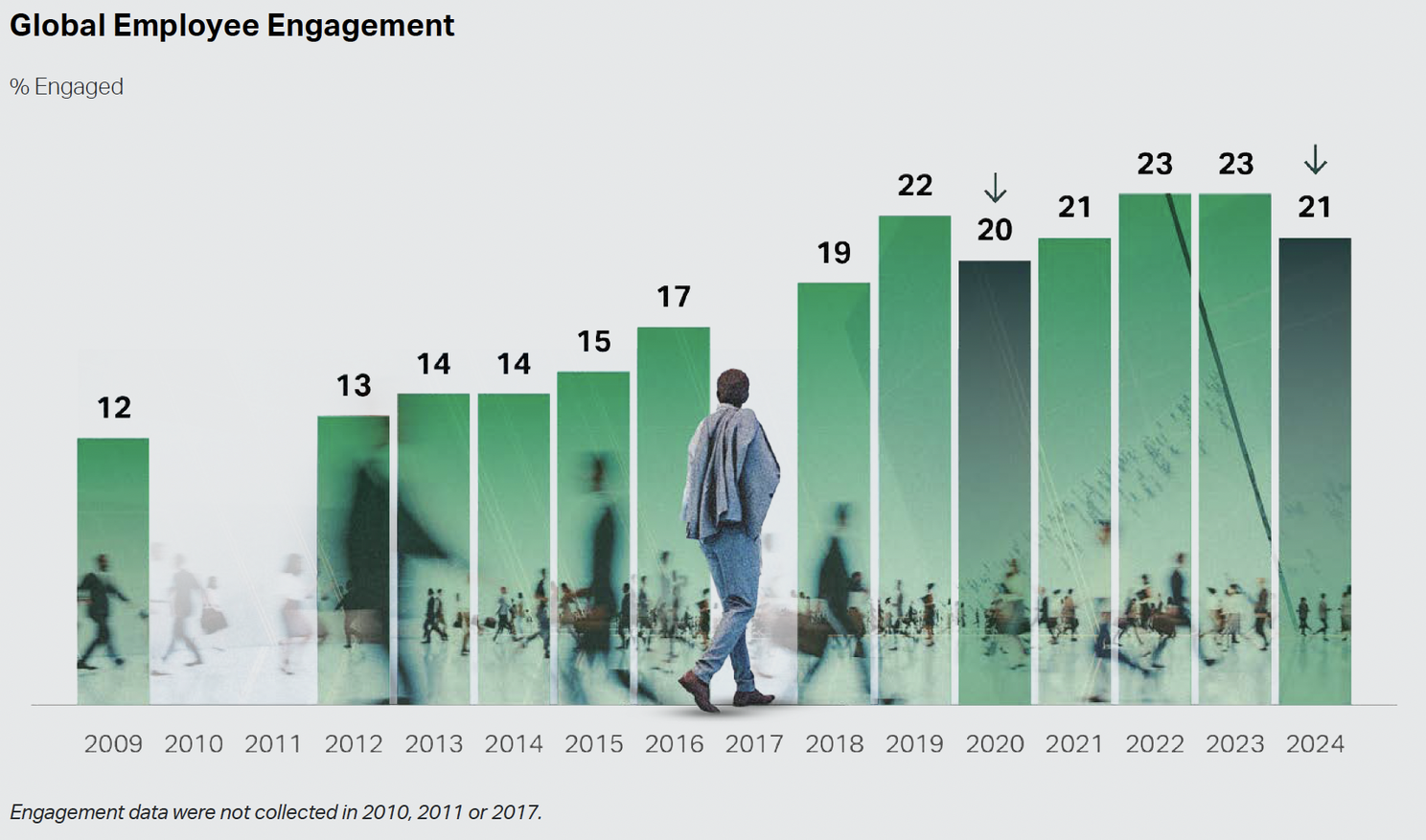A young manager once told me:
“I used to love this job. But now, every time a Slack ping lights up, my stomach turns. I manage six people. I get no support. I am constantly on edge. This cannot be leadership.”
That sentence stayed with me.
This year, Gallup confirmed what many of us already sense: managers are at breaking point. Especially the ones under 35. And especially women. The data is quite clear: in 2024, manager engagement fell 3% points overall. But young managers dropped by 5% points, and female managers by 7% points. That is not a dip. That is a cliff.
And here also lies the paradox: while manager engagement is failing, we depend on them more than ever to fix everything.
70% of a team’s engagement is directly determined by its manager.
(Gallup, 2025 State of the Global Workplace Report)
Let that sink in for a second. At the very moment our systems depend most on their engagement, they are losing theirs.
So, what happened?

The silent squeeze on the modern manager
Today’s manager stands at the epicentre of contradiction.
From above, executives push for results: digital adoption, resilience, growth, and visibility. From below, employees ask for purpose, empathy, balance, and belonging. Converging from all sides, change is relentless.
The post-pandemic workplace has turned the manager’s role into something almost unmanageable:
- Teams are understaffed, yet expectations are rising.
- Budgets are shrinking, but change is non-negotiable.
- AI creates opportunity but also overwhelms.
- Trust is broken, and re-earning it has become the manager’s unpaid second job.
And yet, most of these managers were promoted for performance, not for their ability to lead their people and teams. They were great at delivery but not as skilled in handling emotions, giving feedback, or creating a safe environment. And even worse, most have never been taught how to lead at all.
Only 44% of managers globally say they have received any formal training.
(Gallup, 2025)
It seems that we simply take our best performers and ask them to carry the business and organisational culture. And now, many are quietly drowning. Not a real surprise, right?
From disengaged leaders to disengaged teams
Zooming out, this is not just about the manager. When they break, teams crack.
Gallup’s data show a direct line between manager well-being and team engagement. When a manager is disengaged, so is their team. When a manager is thriving, their team thrives too.
And when you look at the broader picture, the pattern is worrying:
- Global engagement fell from 23% to 21% last year. The same drop we saw during the first wave of COVID.
- Female managers’ wellbeing declined 7% points.
- Stress, sadness, and loneliness among under-35s are all rising.

Behind these statistics are, as always, human stories. People who care but are running out of energy. People promoted into pressure cookers and feel out of place. People unsure how to ask for help because they were supposed to have the answers. Going back in mind, I can still remember those days as well.
In my work supporting large enterprises, SMEs, and their change leaders, I meet a wide variety of managers each year. Many have the potential to be incredible leaders. But potential without support becomes a burden.
They tell us:
- “No one ever explained what leadership really means.”
- “I want to be there for my team, but I do not even have time to think.”
- “I was trained in compliance, not in people.”
This is where leadership development often fails. When it focuses on policy, not on purpose. On systems, not on self-awareness.
So, what does work?
We’ve created leadership programmes at Twinxter and TwinxterAcademy that focus on a people-first approach. Not because it sounds nice, but because it works. Here is what we see makes the difference:
- Purpose before process. Managers who reconnect with their personal purpose become steadier, clearer, and more confident. Leadership starts with self.
- Safe spaces to grow. Our Role Model programme, for example, shows this again and again. When you give managers a trusted community to reflect, share, and experiment, they start to lead with courage.
- Coaching, not commanding. I show and teach managers how to coach and not to manage their teams. Big difference. And to be sure: this is definitely not a soft skill. It is a business skill that unlocks performance. Gallup found that training managers in coaching boosts their team’s engagement by up to 18%, and their own performance by up to 28%.
- Visual clarity. Visual management tools, such as Obeya, help leaders build a shared rhythm. They promote transparency and link goals together. When teams can see what matters, they move faster with less noise and more ownership.
The question is not why managers are struggling. The question is why we are surprised.
- If we put managers in impossible positions without the right preparation, of course they disengage.
- If we ask them to embody our culture but never invest in their growth, of course they will burn out.
- If we rely on them to deliver change without equipping them for it, of course the change fails.
And when that happens, it is not just the manager who pays the price. It is the team. The customers. And ultimately the business itself.
It is time to rewrite the role of the manager
I believe we are standing at somewhat of a pivotal moment. We all know by now that AI will change the nature of work. Strategy will shift. Roles will blur. But the one thing that will always determine the heartbeat of a team… is the manager.
We must stop treating them as operational bottlenecks and start seeing them as meaning-makers. They help create meaningful work. To do this, managers need:
- Purpose, not just the process.
- Training that boosts their confidence, not just broadens their task list.
- To feel part of something bigger and not stuck between the top floor and the front line.
Because when managers thrive, teams and the people within them rise.
A call to executives and HR leaders
If you want to build a resilient, engaged organisation, start here:
📌 Audit your manager’s development. Are you training them for compliance or for connection?
📌 Reframe your expectations. Are you asking for output, or cultivating ownership?
📌 Invest with urgency. A burned-out manager cannot carry a thriving culture.
I believe change does not begin with systems. It begins with people. And the people who matter most right now? Your managers.
Let us equip them to lead, not survive.
Let us help them build the skills and the space to thrive. And let us remember that engagement does not live in a dashboard. It lives in the trust between one person and the people they lead.
To learn more about my work, visit www.twinxter.com andwww.twinxteracademy.com.
Thanks for taking the time to read my article.
If you found this article valuable, then please share it with your network.
I look forward to connecting with you and collaborate to shape a thriving future for all.
Have a great day!
Alize Hofmeester
It’s my purpose to create space where everyone is able to thrive.
Human-centric. Purpose-driven. Value-based
Are you ready to change the status quo? Let’s talk accelerating change.

